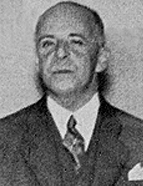

In contrast to his work, Gastão de Mello de Mattos's life reflects an almost complete silence, one that can only be filled by piecing together scattered details that do not always directly pertain to his academic persona that led him to pursue the field of History. António da Silva Rêgo regarded him as one of the "most active, though least known" members of the Academia Portuguesa da História (A. Rêgo, History in times of fascism …, 2015, p. 27), and indeed, he remained so. Born in Aveiro on 11 December 1890 to José Maria de Mello de Mattos and Hostilina Gomes Teixeira de Mattos, Gastão Mat t os passed away in Lisbon at the age of 81. His father, born in Porto, worked as an engineer in the Ministry of Public Works from 1886 and later transitioned into banking as a director of the bank Montepio Geral. His father too published an extensive body of work and served as director of the magazine Construção Moderna.
He trained at the Escola do Exército [Army School] and later became an artillery officer, serving in the First World War as part of the 1917 expedition to Mozambique (Processo Político do Capitão de Artilharia Gastão de Mattos [Political Case of Artillery Captain Gastão de Mattos], Military Historical Archive, Direcção de Justiça e Disciplina). His service earned him a promotion to the rank of captain (C. Ferreira, "Aveirenses Ilustres...", 2020). However, in 1919, he was dismissed from the army, accused of being, as he would later acknowledge himself, "the known monarchist that he is" (B. Maia, As minhas entrevistas... [My interviews...], 1928). At the age of 35, when questioned about his profession after the events later known as the "Bloody Night," he simply replied that he was a "landlord in Porto" (Idem, ibidem), offering no further details. Shortly after, in 1932, Mello de Mattos followed in his father's footsteps by entering the banking sector, taking on the role of government commissioner at the Banco Português e Brasileiro [Portuguese and Brazilian Bank]. This was just one of many roles connecting him to the government from early on; he also served as a member of the Comissão de Censura dos Espetáculos [Entertainment Censorship Commission] (C. Ferreira, "Illustrious people from Aveiro...", 2020) and as a member of the Centro de Acção Popular (Popular Action Centre], a group formed in 1948 within the União Nacional [National Union] that brought together scholars, military personnel, and politicians aligned with Marcello Caetano ("Centro de Acção Popular", Politipedia). Alfredo Pimenta even suggested Mello de Mattos as director of the Military Historical Archive, a role he ultimately did not take on due to not meeting the legal requirements (Letter from Santos Costa to Alfredo Pimenta, 24 August 1949, Alfredo Pimenta Municipal Archive). Alongside this vote of confidence, Pimenta openly expressed his admiration for Mattos, his close friend, even stating publicly that he regarded him as intellectually superior to names such as António Sardinha (A. Ventura, “António Sardinha Republicano”, 2003).
This work is financed by national funds through FCT - Foundation for Science and Technology, I.P, in the scope of the projects UIDB/04311/2020 and UIDP/04311/2020.
